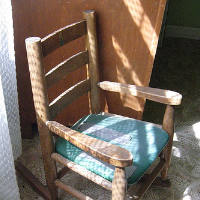Quick hypothetical question: where would you get more work done? Lying on a beach with your friends, or sitting alone in an office room?
I would wager that the majority of people would be far more productive in the office room. The beach is great, but between distracting conversation of friends and the lazy rays of the sun, it isn’t a work-finishing environment.
Using Discomfort to Motivate Yourself
I think this principle is true of a lot of things: when everything is going perfectly, fewer things get done. Chris Guillebeau of The Art of Nonconformity had a great entry recently on how uncertainty motivates him. I would generalize his theory to say that the low periods in your life are often your most productive.
Think if you were sitting on an itchy chair. The discomfort would probably give you motivation to get up and do something. It’s the soft, leather recliners that make you want to go to sleep.
For myself, I know that the periods I got the most work done for this website wasn’t when I was earning a reasonable income. It was when I was bringing in pennies a day that I did the most work on projects.
Ride the Ebbs
Success usually isn’t a constant, it’s an ebb and flow. You’ll have a period of months where nothing can stop you, and you enjoy wins with few exceptions. Then there are also periods of uncomfortable setbacks.
Although most people constantly seek the enjoyable wins, I think the flow of good and bad can be helpful. During an ebb you can use the discomfort to motivate yourself to new heights. The productivity you assert in your ebb phase makes the next flow phase that much better.
Discomfort Isn’t the Sole Motivator
An itchy chair isn’t the only way to motivate yourself. You can be motivated by a feeling of purpose, or a creative passion. People aren’t trapped in choosing between unmotivated pleasantness and motivated discomfort. You can be happy and ambitious at the same time.
However, if you find yourself sitting in an uncomfortable position, why not use it? Instead of viewing the dip in your life as a weakness, make it a point of strength.
I’ve found that I improve myself more when I’m outside a relationship, than in one. While this is far from a universal truth, being alone can spur you to make changes you otherwise wouldn’t. The lack of comfort and security give you nothing to relax against, and you can push yourself forward.
Of course, some people find the opposite true: when they are in a relationship, they are able to focus more. You need to twist what you’ve got to make it work for you. If you’re alone, use the extra time and freedom to push yourself forward. If you’re together, use the extra emotional support to focus. The same applies whether you’re poor or rich, unhealthy or fit, busy or have unlimited time.
I’m not saying you should avoid doing things that will make you comfortable or happy. That will probably result in even less motivation. But you should recognize what part of the wave you’re in, and learn how to ride it. If you happen to be in a position of recession, use that to drive you.


 I'm a Wall Street Journal bestselling author, podcast host, computer programmer and an avid reader. Since 2006, I've published weekly essays on this website to help people like you learn and think better. My work has been featured in The New York Times, BBC, TEDx, Pocket, Business Insider and more. I don't promise I have all the answers, just a place to start.
I'm a Wall Street Journal bestselling author, podcast host, computer programmer and an avid reader. Since 2006, I've published weekly essays on this website to help people like you learn and think better. My work has been featured in The New York Times, BBC, TEDx, Pocket, Business Insider and more. I don't promise I have all the answers, just a place to start.